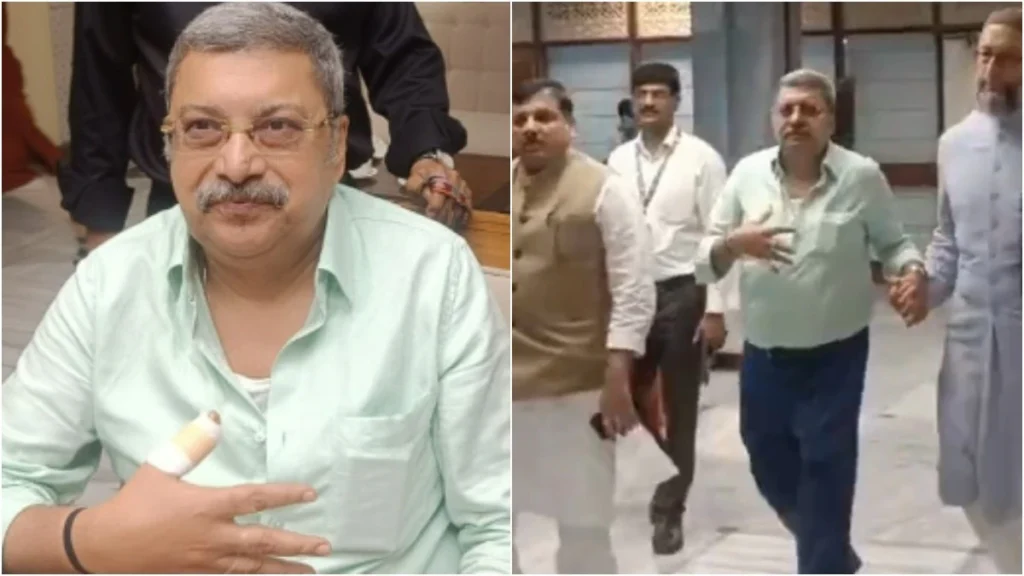Introduction:
Tensions ran high in a Joint Parliamentary Committee (JPC) meeting over the Waqf (Amendment) Bill, which led to an outburst by Trinamool Congress MP Kalyan Banerjee. In a fit of rage, Banerjee shattered the glass water bottle next to him in the committee room with his hand. The incident on Tuesday marks the heightening struggle between opposition members and BJP MPs over the contentious Waqf Bill. Here is a close look at what unfolded afterwards.
Heated Exchange: Important Moments
JPC Meeting on Waqf Bill:
The clash happened during a Joint Parliamentary Committee meeting on the Waqf (Amendment) Bill, which was held at Parliament Annexe.
The Committee had intended to discuss the bill, which the opposition has been vociferous about. Various political parties have been raising objections to the bill because of its repercussions.
JPC Meeting: War of Words between Kalyan Banerjee and Abhijit Gangopadhyay:
Reports suggest that the ruckus began when Trinamool MP Kalyan Banerjee attempted to raise a point out of turn.
BJP MP Abhijit Gangopadhyay complained against Banerjee’s interruption that had sparked an uproar between the two of them.
The members claim that Banerjee used derogatory words during the verbal argument that made the House atmosphere extremely volatile.
The Bottle-Breaking incident:
In a fit of rage, Kalyan Banerjee picked up a glass water bottle from the table and broke it, reportedly by mishap.
This brought injury to his hand and he had to be given four stitches for the same.
Despite that, Banerjee was seen being taken back to the meeting room by AIMIM chief Asaduddin Owaisi and AAP leader Sanjay Singh.
Suspension from Future Sessions:
After the controversy, JPC Chairman Jagdambika Pal banned Kalyan Banerjee from attending the Waqf Bill panel meeting to be held next.
The verdict was by voting where nine were on one side that is suspending Banerjee while seven opposed the same. This also shows how the entire committee has been polarized.
Banerjee’s suspension has seen the level of confrontation between the BJP MPs who form the ruling party and MPs from other opposition parties increase.
Previous Scuffles in the JPC:
This is not the first time that the JPC meeting on the Waqf Bill has seen sharp confrontations.
Just a week ago, Kalyan Banerjee was embroiled in another heated exchange with BJP MPs Nishikant Dubey, Dilip Saikia, and Abhijit Gangopadhyay.
The Opposition members had walked out of that meeting after accusing the BJP MPs of using offensive language and raising objections over the way the meeting was being conducted.
Allegations against JPC Chairman Jagdambika Pal:
Members of the opposition have been complaining that Jagdambika Pal was making things difficult for them. They said the chairman was not adhering to parliamentary rules and had not taken action against BJP MPs who used abusive language on every occasion.
On the other hand, MPs of BJP, including Tejasvi Surya, have written a letter to Lok Sabha Speaker stating that members of opposition have even been threatening the chairperson of JPC, and also tearing official documents.
Waqf (Amendment) Bill : Background and Opposition
Waqf (Amendment) Bill Introduction:
The Central Government brought the Waqf (Amendment) Bill before the Parliament for the first time on July 28, 2024.
The bill tries to impose strict restrictions on the Waqf boards’ powers by disallowing them from declaring property or areas as “Waqf property.”
Opposition lawmakers from TMC, Congress, AAP, and others do not want these provisions in the Bill, which they feel would stomp on minority communities’ rights.
Letter to the JPC:
The opposition parties made so strong an opposition that the government had to send the bill to the Joint Parliamentary Committee (JPC) on 8 August 2024 for further discussion and debate.
The JPC meetings have gone on record without any mature progress on the discussion of the bill due to continuous clashes between BJP MPs and the members from the Opposition parties .
BJP Revokes Allegations Against the Opposition
BJP MPs have been criticized by opposition members for dominating the debates and using aggressive tactics to curb their objections.
The opposition increasingly views the opinion that BJP wants the bill to pass with an incomplete redressal of concerns without having reasonable debate on issues.
Impact on Working of JPC
The breaking of bottles and suspension of Kalyan Banerjee will probably dent the fractured relationship further.
Since the bill is still at the centre of controversy, prospects for future sittings seem bleak when such clashes have taken place in the background.
Implications of Passage of Waqf Bill:.
However, the government may have to search for some means of appeasing the opposition and ensuring that the bill is dealt with in a more constructive discussion, but this seems unlikely at present.
Public and Political Responses:
The incident has already gained much media attention, and the larger public may look at this as yet another example of how polarized and divided Indian politics have become.
With the two entities-the BJP and opposition parties-so unyielding in their views, the Waqf Bill may soon turn into a political hot potato.
Conclusion: A Divisive Moment in Parliament
The ruckus at the JPC meeting on the Waqf Bill is a manifestation of how Indian politics are becoming increasingly polarized. The incident presents a sad reflection of the level of frustration and discord that is existing within the parliamentary process, particularly in the wake of the outburst of Trinamool MP Kalyan Banerjee and his suspension following that. Of course, the time for the Waqf Bill to find peaceful and constructive dialogue within Parliament has been more urgent than ever. The outcome, however, will hinge on whether or not both parties can come together to find common ground in this much-debated topic with their tempers flaring and accusations flying.

